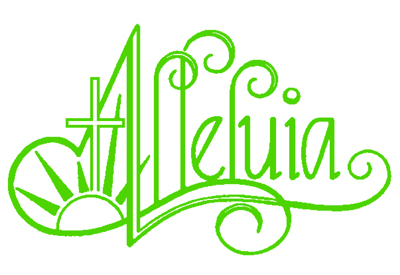You
say hallelujah,
I say alleluia; let’s NOT call the whole thing off![1]
We fasted from the word alleluia
during Lent.[2] In Easter, we feast; our worship is full of alleluias!
Or is it hallelujahs? Someone recently
asked me: why two different spellings of the word?
The word hallelujah translates
from Hebrew to ‘Praise the Lord!’ It is a plural imperative of the verb hālal, ‘praise,’ with the object yāh, (an abbreviated form of YWWH, the
Hebrew word for the God of Israel, which is never pronounced by Jews.) It is
used in both Jewish and Christian liturgies to this day.[3]
So why the two spellings? When we are reading from the Old
Testament or singing the psalms, we use hallelujah,
because the Old Testament, including the Psalms, is in Hebrew, and our
English translation retains the consonants as closely as possible.

The word alleluia is
a Greek/Latin transliteration of hallelujah.
So when we sing the word in the liturgy, we use alleluia, because our liturgy is a revision of the Latin Mass,
which uses the spelling alleluia.
Hymns can use either hallelujah
or alleluia. It would be
interesting to go through hymns and see which ones use which and try to explain the reasons why, but that would be too much detail and I don’t have time.
But here is
something we all should know too: even though the spellings are different, the
first vowel is pronounced the same way: ‘a:’ as in the word ah or far, not ‘ae’ as in the word ‘cat’ or the first name ‘Al.’
Whatever way you spell it, praise the Lord! Hallelujah![4]
Pastor
Frontz
